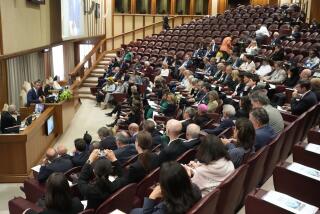Religious Groups Join Hands to Protect the Gifts of Nature
- Share via
WASHINGTON — The mission is both simple and daunting: to look at the nation’s environment from a theological perspective. It offers the simplicity of a freshwater spring, the daunting scope of the disciplines of faith to which humanity turns to find its place in the universe.
It is an idea that is taking hold among a small but diverse group of religious figures.
Fueled by $4 million in contributions from a variety of foundations with such names as Pew and Turner, they are trying to spread the notion that the safety net cast by churches and synagogues in past generations to protect the poor must now be extended to the environment.
In short, worshiping the Creator can also mean worshiping the creation.
For years, said Paul Gorman, executive director of the National Religious Partnership for the Environment, organized religion steered clear of focusing on the environment. It turned its attention to poverty, to hunger, to education, to civil rights. But the environment offered a troubling theological element.
“Environmentalists worship nature. It’s paganism. It’s New Age,” Gorman said, recounting the undercurrent of skepticism, even mistrust, that flowed between mainstream religion and clean-stream environmentalists.
Then there was the idea that environmentalists put greater stock in four-legged furballs than in two-legged humans, that they favored endangered species over endangered communities. Or, as a senior Roman Catholic bishop once put it to Gorman: “How come I never see any people on a Sierra Club calendar?”
So, for some in the religious community, the idea of melding environmental concerns with their faith, of finding a comfortable intersection of science and theology, comes not as a logical progression but as a shock. Think Copernicus. Think Galileo. Think Darwin.
“Here comes science, with new information and new data and new perspectives on where we are and why we are and how we are here, and it engages with religious thought,” Gorman said.
“Here comes environmentalism. On the one hand, you have a recognition there is something inescapably and intrinsically religious: the condition of God’s creation at human hands,” he added. But it is being presented as a scientific discipline, “with which we [in the religious community] are not familiar.”
Among each faith brought into the coalition, the unease with which religion encountered environmentalism was clear.
“We’re an urban people. We don’t like the wilderness. This isn’t for us,” Gorman heard when Jewish groups were approached. He replied: “I’m glad Moses didn’t feel that way.”
Evangelical Christians, adhering to a literal interpretation of the Bible, found comfort in the campaign to protect endangered species--not for scientific or pharmaceutical reasons but as the living embodiment of the lessons of Noah. “It’s the Ark, not Merck,” Gorman told them, invoking the name of a major pharmaceutical firm.
Roman Catholics were focused on the plight of the poor, on issues of justice and peace. They found a mission in the recognition that inner-city neighborhoods are most often the victims of environmental degradation.
Which brings us to Washington and a series of meetings Wednesday and today that a less-sensitive group might call lobbying.
A small congregation of rabbis, ministers and priests--a group representing the scope of Judaism from Reconstructionism to Orthodox; the U.S. Catholic Conference; the National Council of Churches of Christ, which includes 32 mainline Protestant, Eastern Orthodox and historic black churches; and the Evangelical Environmental Network--is visiting with Vice President Al Gore and several senators, all but one of them Republicans.
Their message, according to Gorman: “To the Republicans, we’re saying: ‘Across a bipartisan spectrum of major faith groups, this is a fundamental priority.’ To the administration, we’re saying: ‘You’ve got to pay attention to the relationship between the environment and social justice and poverty.’ ”
More to Read
Sign up for Essential California
The most important California stories and recommendations in your inbox every morning.
You may occasionally receive promotional content from the Los Angeles Times.













